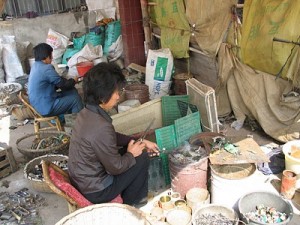22-Feb-2010
United Nations University, Tokyo / United Nations Environment Programme, Nairobi
Rocketing sales of cell phones, gadgets, appliances forecast in China, India, elsewhere
 Sales of electronic products in countries like China and India and across continents such as Africa and Latin America are set to rise sharply in the next 10 years. And, unless action is stepped up to properly collect and recycle materials, many developing countries face the spectre of hazardous e-waste mountains with serious consequences for the environment and public health, according to UN experts in a landmark report released today by UNEP.Issued at a meeting of Basel Convention and other world chemical authorities prior to UNEP’s Governing Council meeting in Bali, Indonesia, the report, “Recycling – from E-Waste to Resources,” used data from 11 representative developing countries to estimate current and future e-waste generation – which includes old and dilapidated desk and laptop computers, printers, mobile phones, pagers, digital photo and music devices, refrigerators, toys and televisions.
Sales of electronic products in countries like China and India and across continents such as Africa and Latin America are set to rise sharply in the next 10 years. And, unless action is stepped up to properly collect and recycle materials, many developing countries face the spectre of hazardous e-waste mountains with serious consequences for the environment and public health, according to UN experts in a landmark report released today by UNEP.Issued at a meeting of Basel Convention and other world chemical authorities prior to UNEP’s Governing Council meeting in Bali, Indonesia, the report, “Recycling – from E-Waste to Resources,” used data from 11 representative developing countries to estimate current and future e-waste generation – which includes old and dilapidated desk and laptop computers, printers, mobile phones, pagers, digital photo and music devices, refrigerators, toys and televisions.
In South Africa and China for example, the report predicts that by 2020 e-waste from old computers will have jumped by 200 to 400 percent from 2007 levels, and by 500% in India
By that same year in China, e-waste from discarded mobile phones will be about 7 times higher than 2007 levels and, in India, 18 times higher.
By 2020, e-waste from televisions will be 1.5 to 2 times higher in China and India while in India e-waste from discarded refrigerators will double or triple.
China already produces about 2.3 million tonnes (2010 estimate) domestically, second only to the United States with about 3 million tonnes. And, despite having banned e-waste imports, China remains a major e-waste dumping ground for developed countries.
Moreover, most e-waste in China is improperly handled, much of it incinerated by backyard recyclers to recover valuable metals like gold — practices that release steady plumes of far-reaching toxic pollution and yield very low metal recovery rates compared to state-of-the-art industrial facilities.
Full news release, click here
Example coverage:
The Guardian, click here
Reuters, click here
Agence France Presse, click here